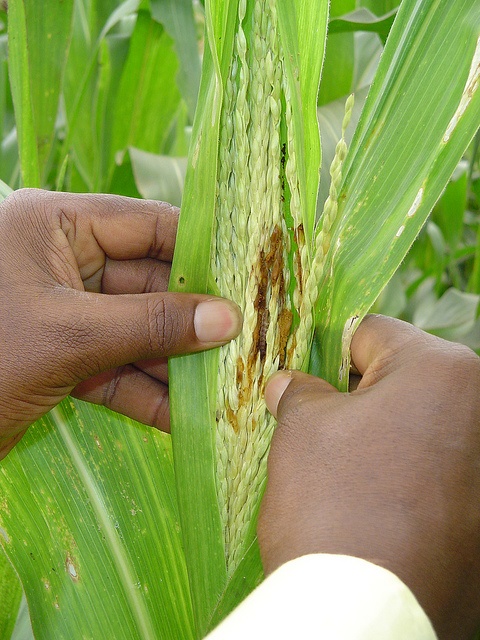
MEXICO CITY (CIMMYT) – A new review of a biological control (BC) program for control of stem borers implemented from 1993 to 2008, in an effort to reduce cereal yield losses due to stemborer attacks in East and Southern Africa, highlights the potential for BC programs to lift a large number of people out of poverty and create greater returns for consumers and producers.
In 1993 the International Centre of Insect Physiology and Ecology program released four biological control agents to control the economically important stem borer pests Busseola fusca, Chilo partellus and Sesamia calamistis. Two of the natural enemies that were released were established and spread throughout the region. The researchers used an economic surplus approach, using bio-agents related data and market data from Kenya, Mozambique and Zambia, to determine the benefits of BC for producers and consumers.
More than 135,000 people were estimated to be lifted out of poverty annually due to the BC intervention, contributing an aggregate monetary surplus of $1.4 billion to the economies of the three countries, with 84 percent from maize production. The study also found that BC research and intervention is very efficient, with an internal rate of return of 67 percent – compared to the considered discount rate of 10 percent – and an estimated benefit-cost ratio of 33:1.
The authors of the study argue that these successful findings underscore the need for increased investment in BC research to sustain cereal production and improve poor living conditions.
Learn more about the study “Assessing the long-term welfare effects of the biological control of cereal stemborer pests in East and Southern Africa: Evidence from Kenya, Mozambique and Zambia” and check out other new publications from CIMMYT scientists, below.
- Access to safe drinking water and human health: empirical evidence from rural Bhutan. 2016. Dil Bahadur Rahut, Ali, A., Nar Bahadur Chhetri Behera, B., Pradyot Ranjan Jena. In: Water Science and Technology. Vol. 16, no. 5, p. 1349-1360.
- Agricultural technology adoption, commercialization and smallholder rice farmers’ welfare in rural Nigeria. 2016. Awotide, B. A., Karimov, A., Diagne, A. In: Agricultural and food economics. Vol. 4, no. 3.
- Agrobiodiversity: prospects for a genetic approach to In situ conservation of crop landraces. 2016. Qualset, C.O., Castillo-Gonzales, F., Morgounov, A.I., Keser, M., Ozdemir, F. In: Indian Journal of Plant Genetic Resources. Vol. 29, issue 3, p. 278-280.
- An alternative strategy for targeted gene replacement in plants using a dual-sgRNA/Cas9 design. 2016. Yongping Zhao, Congsheng Zhang, Wenwen Liu, Wei Gao, Changlin Liu, Gaoyuan Song, Wen-Xue Li, Long Mao, Beijiu Chen, Yunbi Xu, Xinhai Li, Chuanxiao Xie. In: Nature Scientific reports. 2016., vol.6, no. 23890.
- Assessing the long-term welfare effects of the biological control of cereal stemborer pests in East and Southern Africa: Evidence from Kenya, Mozambique and Zambia. 2016. Midingoy, S. G., Affognon, H. D. Macharia, I. Ong’amo, G. Abonyo, E. Ogola, G. De Groote, H. LeRu, B. In: Agriculture, Ecosystems and Environment. Vol. 23, p. 10-23.
- Development of a maize 55 K SNP array with improved genome coverage for molecular breeding. 2017. Cheng Xu, Yonghong Ren, Yinqiao Jian, Zifeng Guo, Zhang Yan, Chuanxiao Xie, Junjie Fu, Hongwu Wang, Guoying Wang, Yunbi Xu, Zhang Li-Ping, Cheng Zou. In: Molecular Breeding. Vol.37, no.20, p.1-12.
- Development of a multiple-hybrid population for genome-wide association studies: theoretical consideration and genetic mapping of flowering traits in maize. 2017. Hui Wang, Cheng Xu, Xiaogang Liu, Zifeng Guo, Xiaojie Xu, Shanhong Wang, Chuanxiao Xie, Wen-Xue Li, Cheng Zou, Yunbi Xu. In: Nature Scientific reports. Vol.7, no. 40239.
- Elite Haplotypes of a Protein Kinase Gene TaSnRK2.3 associated with important agronomic traits in Common Wheat. 2017. Lili Miao, Xinguo Mao, Jingyi Wang, Zicheng Liu, Bin Zhang, Weiyu Li, Xiaoping Chang, Reynolds, M.P., Zhenhua Wang, Ruilian Jing. In: Frontiers in Plant Science. v.8, no.368.
- Evaluation of the APSIM model in cropping systems of Asia. 2017. Gaydon, D.S., Singh, B., Wang, E., Poulton, P.L., Ahmad, B., Ahmed, F., Akhter, S., Ali, I., Amarasingha, R., Chaki, A.K., Chen, C., Choudhury, B.U., Darai, R., Das, A., Hochman, Z., Horan, H., Hosang, E.Y., Vijaya Kumar, P., Khan, A.S.M.M.R., Laing, A.M., Liu, L., Malaviachichi, M.A.P.W.K., Mohapatra, K.P., Muttaleb, M.A., Power, B., Radanielson, A.M., Rai, G.S., Rashid, M.H., Rathanayake, W.M.U.K., Sarker, M.M.R., Sena, D.R., Shamim, M., Subash, N., Suriadi, A., Suriyagoda, L.D.B., Wang, G., Wang, J., Yadav, R.K., Roth, C.H. In: Field Crops Research. Vol.204, p.52-75.
- Farmers’ prioritization of climate-smart agriculture (CSA) technologies. 2017. Khatri-Chhetri, A., Aggarwal, P.K., Joshi, P.K., Vyas, A.K. In: Agricultural Systems. Vol.151, p.184-191.
 Nutrition, health and food security
Nutrition, health and food security